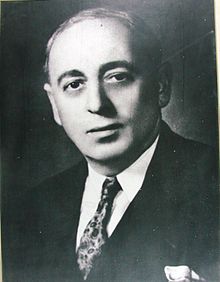
Back زكي الأرسوزي Arabic زكى الارسوزى ARZ Zəki Ərsuzi Azerbaijani Zaki al-Arsuzi German Zaki al-Arsuzi Spanish زکی ارسوزی Persian Zaki al-Arsouzi French זכי אל-ארסוזי HE Zaki al-Arsuzi ID Zaki al-Arsuzi Italian
Zaki al-Arsuzi زكي الأرسوزي | |
|---|---|
 al-Arsuzi before 1939 | |
| Born | June 1899 |
| Died | 2 July 1968 (aged 69) Damascus, Syria |
| Era | 20th-century philosophy |
| Region | Eastern philosophy |
| School | Ba'athism, Arab nationalism |
Main interests | Politics, philosophy, sociology, nationalism, philology, history |
Notable ideas | Co-founder of Ba'athism (with Aflaq and al-Bitar), The Genius of Arabic in its Tongue |
Zaki al-Arsuzi (Arabic: زكي الأرسوزي, romanized: Zakī al-Arsūzī; June 1899 – 2 July 1968) was a Syrian philosopher, philologist, sociologist, historian, and Arab nationalist. His ideas played a significant role in the development of Ba'athism and its political movement. He published several books during his lifetime, most notably The Genius of Arabic in its Tongue (1943).
Born into a middle-class family in Latakia, Syria, al-Arsuzi studied at the Sorbonne, where he became interested in nationalism. In 1930, he returned to Syria, where he became a member of the League of National Action (LNA) in 1933. In 1938, he moved to Damascus because of his disillusionment with party work, and in 1939, he left the LNA. In Damascus al-Arsuzi established and headed a group consisting of mostly secondary school pupils who would often discuss European history, nationalism and philosophy. Shortly after leaving the LNA, al-Arsuzi established the Arab National Party, an Arab nationalist party with a "defined creed". It was not a success and, on his return to Syria in November 1940 after a brief stay in Baghdad, al-Arsuzi established a new party, the Arab Ba'ath; by 1944, however, most of its members had left and joined Michel Aflaq's and Salah al-Din al-Bitar's Arab Ba'ath Movement, which subscribed to a nearly identical doctrine.
In 1947, the two movements merged, forming a single Arab Ba'ath Party. Despite the merger, Al-Arsuzi neither attended its founding conference nor was given membership.
During the rest of the 1940s and 1950s, al-Arsuzi stayed out of politics and worked as a teacher. He made a comeback during the 1960s power struggle in the Ba'ath Party between Aflaq and al-Bitar on one hand and Salah Jadid and Hafiz al-Assad on the other. When Aflaq and al-Bitar lost the power struggle and were forced to escape from Syria in 1966, al-Arsuzi replaced Aflaq as the main ideologue of the Syrian-led faction of the Ba'ath Party.
Al-Arsuzi's theories about society, language and nationalism, which are collectively part of Ba'athist thought, hold that the Arab Nation will be unified when the Arab people reestablish the Arab identity they have lost over the past 1000 years. The key to Arab unification, according to al-Arsuzi, is through language. In contrast to the Latin language, al-Arsuzi argued, Arabic was far less arbitrary and far more intuitive. Despite his contributions to Ba'athist thought, al-Arsuzi is barely mentioned in Western or Arab scholarship. This omission may be linked to the fact that Sati' al-Husri, a contemporary Arab nationalist, had many of the same ideas as al-Arsuzi but was better able to articulate them.
© MMXXIII Rich X Search. We shall prevail. All rights reserved. Rich X Search